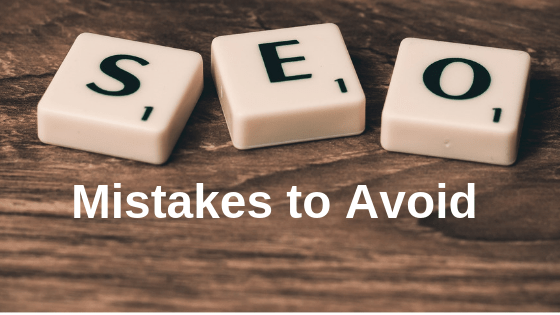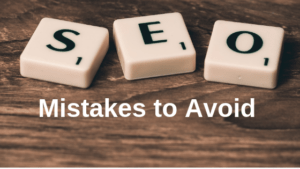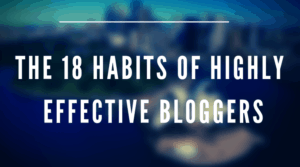Did you know that Google has the power to make your blog disappear from its search results?
One day you’re celebrating a new traffic milestone and the next you’re scratching your head trying to figure out what happened to all that traffic.
The worst part is that Google doesn’t send you a warning prior to penalizing your site. Either your blog is in good standing or it’s not.
And it can happen to anyone — giant sites such as Expedia, BMW, and Overstock have been penalized by Google.
No site is too big or too small to be penalized by Google for bad behavior.
And it happens all the time, especially when new algorithm updates take effect.
So is there anything you can do to avoid having your blog penalized by Google?
Yes… stay clear of these 9 SEO Mistakes:
SEO Mistake #1. Buying Links
We all know the best way to quickly move up the Google ladder is to gain quality backlinks from relevant and authoritative websites.
This takes time, especially for those of you starting a new blog.
This is why many bloggers try to skip the natural process of building up their link profile and resort to buying links as a way of quickly moving up the Google rankings.
I won’t mention any of the places where you could do that because I don’t want you to even think about it.
Buying Links is the surest way to get your blog penalized by Google.
So if you ever come across a firm or individual promising you hundreds of links and first page ranking for a minimal fee stay clear.
Almost always, the links are from spammy, low-quality sites and social networking accounts.
Getting links from them is the equivalent of going to a job interview with a letter of recommendation from a well-known alcoholic. It hurts you more than it helps.
And don’t fall for their pitch about how smart they are and how Google will never find them. It’s never a good idea.
To be honest, it might even work for a while but in the long run, Google will always find you and when they do, you’ll regret it
SEO Mistake #2. Keyword Stuffing
Just in case you don’t know what keyword stuffing is, below is a great example:

By Google’s own definition:
“Keyword stuffing” refers to the practice of loading a webpage with keywords or numbers in an attempt to manipulate a site’s ranking in Google search results.
Many bloggers fall into the trap of keyword stuffing because many gurus out there recommend that you use your keywords a specific amount of times throughout your writing. Most of these “gurus” recommend that you use your keywords between 2-10% of the time.
This tactic used to work well about 10 years ago, but on April 24, 2012, Google’s Penguin update put a halt to it.
Every blog post you write should have a keyword or phrase in mind for which you would like it to rank.
However, trying to unnaturally use the keyword or phrase in an attempt to manipulate Google into ranking you above your competitors because of “relevancy” is one of the SEO mistakes you want to avoid at all costs.
Focus on creating jaw-dropping content that’s useful to your readers which makes proper use of your keywords without worrying about how many times you’ve used your keywords and Google will reward you for it.
SEO Mistake #3. Misusing Anchor Text
If you’re not familiar with the term “anchor text,” it refers to the text inside of a link.
Quitting your job to become a full-time blogger is a nerve-wracking decision to make.
In the sentence above, “quitting your job” is the anchor text.
One of the ways Google decides what to rank your blog pages for is by looking at your anchor text. If a lot of people are linking to one of your blog posts with “how to start a blog” as the anchor text, for example, there’s a google chance the blog post is about starting a new blog.
So as you can imagine many bloggers try to game the system by building links with specific terms they want to rank for as anchor text even if the content is irrelevant.
Using the same anchor text to build your rankings doesn’t look natural.
Not everyone is going to use the exact same anchor text when linking out to you. Some people might use shorter anchor text like “new blog” or related phrases like “creating a new blog.”
By using the same anchor text in a lot of your links, you’re making it obvious to Google that you’re trying to game the system.
And chances are, Google will catch on and penalize you at some point.
SEO Mistake #4. Broken Links
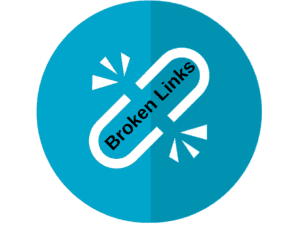
Unfortunately, this is one of the SEO mistakes that you cannot avoid.
If you blog long enough, you’ll accumulate links that no longer work. Over time, many sites shut down, move, and restructure. Making the page you originally linked to vanish.
What sucks is that if broken links are so natural, why does Google penalize you for them?
Well, let’s walk a mile in Google’s shoes:
Which page is more likely to provide their users with a better experience: one with four broken links or one with zero?
The one with zero, of course, all things being equal, a page with no broken links will outrank a page with broken links.
But don’t freak out, having a broken link here and there isn’t going to cause a Google penalization to your blog.
However, having too many could and it’s something you need to avoid.
How?
By popping into Google Webmasters Tools and fixing all the broken links it shows you.
Do this every few months after your first year blogging and you should be alright.
SEO Mistake #5. Duplicate Content
Bill Gates coined the phrase “Content is King” back in 1996.
That’s probably the most popular phrase among content marketing experts.
There are several variations of it, but one you will never hear is “Duplicate Content is King.”
Why?
Google will know if your blog’s content is too similar to another’s, and will penalize for it.
This one is just too obvious so I won’t spend much time on it.
Make sure all of your blog posts are unique and well-written. When in doubt, use tools like Copyscape to check the originality of your content.
Note: I take a lot of ideas from other blogs, but I always put my own spin on things so I don’t worry too much about duplicate content. Stay clear of copying other people’s content word for word.
SEO Mistake #6. Hidden Links
Some bloggers try to game the system by using hidden links within their content.
They hide the links so that users cannot see them and therefore not be affected by them.
However, when Google spiders crawl the page, they see the links because they are part of the coding of that page.
Bloggers normally use hidden links on the most popular pages in their blogs. They do so in hopes of ranking those pages and the ones being referred for specific keywords.
Because the pages are already popular, the hope is tricking Google into thinking the hidden links are relevant to the content within the page even though they usually aren’t.
Hiding them ensures that Google sees them, but users don’t and therefore keeping user experience high.
This tactic goes against Google’s Webmasters Guidelines and is a sure way of sending your blog into oblivion once caught.
Never create a link that’s the same color as the background of a page, even if you have an innocent reason for doing so.
SEO Mistake #7. Joining Private Blog Networks (PBNs)
Let’s first take a look at where PBNs come from.
At some point during the SEO era, some people figured out that the easiest way to build massive amounts of links from high-quality sites was to purchase expired domains that already had a bunch of powerful links pointing to them.
In Google’s eyes, those domains were of high authority, so the moment they were brought back to life, Google would prioritize their rankings.
So if you were to build a nice portfolio of these sites, you could use it to link to other sites and quickly affect their rankings.
And that’s how PBNs got started.
Think of PBNs like a database of websites that, when you join, all give your website backlinks.
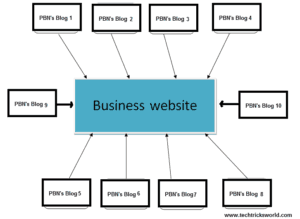
The good news is that most popular PBNs have shut down thanks to Google’s crackdown on this type of behavior.
As far a Google is concerned, any kind of network is a sign of potential rank manipulation so save your hard earned money and stay away from them.
SEO Mistake #8. Getting Hacked
If your blog is hacked, Google will remove it from its results.
Sometimes it will send you a notice, but in most cases, 61% to be exact, it won’t.
This sucks!
Why would Google penalize your blog because some bum decided to hack it?
Well, remember that Google strives to provide its users with the best experience possible and that’s something hacked blogs won’t provide its visitors with.
If you find that your blog has been hacked, act quickly to take care of the problem and contact Google to let them know that you are back in good standing.
Google published an article on identifying vulnerability which you might find useful in preventing your blog from being hacked.
SEO Mistake #9. Too Many Errors
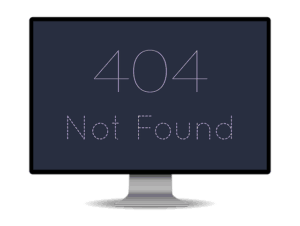
Google hates finding error codes in your blog because they lower the overall user experience of your audience.
Therefore, you should do everything in your power to prevent them.
Below is a list of the most common errors:
- 404 (Not Found)
- 500 (Internal Server Error)
- 403 (Forbidden)
- 400 (Bad Request)
- 401 (Unauthorized)
- 502 (Bad Gateway)
- 503 (Service Unavailable)
- 504 (Gateway Timeout)
To get a more in-depth understanding of what these error codes mean go here.
The moment you come across any of these errors on your blog, stop what you’re doing and fix them.
Feeling Worried?
I can understand if you feel a bit worried after reading all of this.
However, you shouldn’t be. For the most part, the bloggers who get penalized by Google are either SEO geeks who are intentionally trying to game the system or innocents who get advice from the wrong person.
If you’re beginning to learn about SEO and all you’re doing is publishing awesome content and building a connection with your readers, you’re probably safe.
In fact, that’s the mindset I recommend all bloggers to have.
Instead of spending your time trying to figure out how to manipulate the Google algorithm to gain better rankings, just create awesome content that deserves to be on the first page, promote the heck out of it, and wait for Google to reward you.
Their goal, after all, is to provide its users with the best results on top.
In other words, the best way to avoid making most SEO mistakes and stay in Google’s good graces is to follow three simple steps:
- Create awesome content
- Promote it (get influencers talking about it)
- Wait for Google to reward you
Oversimplified?
Perhaps, but that’s exactly what Google wants you to do.
So why would you do anything else?
SEO Mistakes FAQ
What are the common SEO mistakes?
The most common SEO mistakes are keyword stuffing, focusing on the wrong keywords, not entering title tags and meta descriptions, not naming pictures, and not creating internal links.
How SEO is important?
SEO (search engine optimization) is very important. It's basically the process for getting your blog noticed by the search engines. Without SEO, it's difficult to gain organic (free) traffic.
Is SEO Dead?
SEO is not dead. However, search engines have become more sophisticated so many of the SEO tricks that worked years ago such as creating backlinks from irrelevant sources do not work anymore.
What should be avoided in SEO?
Things to avoid in SEO are buying backlinks, copying other people's content (duplicate content), and joining link farms for a quick boost in rankings.
Should I pay for an SEO?
Finding a reputable SEO is difficult. My advice is to learn the basics before hiring a company to handle your SEO duties. Beyond that, do it yourself if you can, but if not, use your knowledge to find a reputable SEO company.
